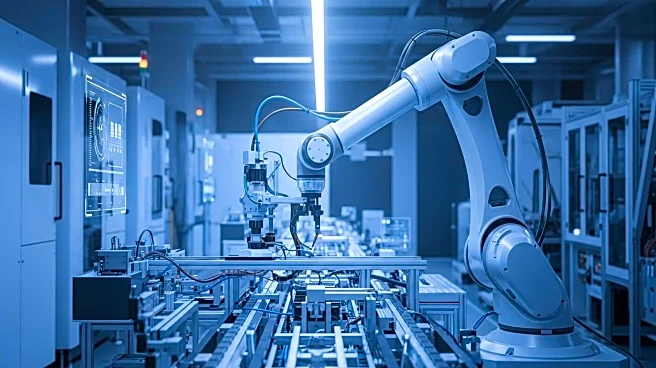What is the story about?
What's Happening?
Manufacturing companies are experiencing difficulties in adopting artificial intelligence (AI) technologies despite significant investments. The phenomenon, termed 'AI-nertia,' highlights the resistance to AI adoption within organizations. This resistance is attributed to factors such as unknown unknowns, loss aversion, and incentive gaps. Manufacturing teams are accustomed to predictable ROI calculations, which makes them hesitant to invest time in understanding AI models that may offer future benefits. Additionally, fear of mistakes and lack of immediate rewards contribute to the reluctance in embracing AI solutions.
Why It's Important?
The slow adoption of AI in manufacturing could hinder the industry's ability to capitalize on substantial efficiency gains. AI has the potential to revolutionize manufacturing processes, offering improvements in production efficiency, defect rates, and delivery timelines. However, if the industry continues to resist AI adoption, it risks missing out on one of the greatest opportunities for advancement in decades. Organizations need to align AI implementation with human incentives to overcome resistance and maximize expected value, ensuring that AI success translates into human success.
What's Next?
To address AI-nertia, companies are encouraged to implement strategies that align AI adoption with human nature. Successful examples include starting with read-only AI systems, creating parallel wins, and sharing the spoils through bonuses and performance reviews. These approaches aim to make AI adoption inevitable by working with human incentives rather than against them. Companies must focus on motivating their workforce and demonstrating the tangible benefits of AI to ensure successful integration and utilization.
Beyond the Headlines
The resistance to AI adoption in manufacturing highlights broader challenges in integrating advanced technologies within traditional industries. It underscores the importance of understanding human behavior and organizational dynamics when implementing technological solutions. The success of AI in manufacturing depends not only on the technology itself but also on the ability to motivate and engage the workforce in its adoption.

















